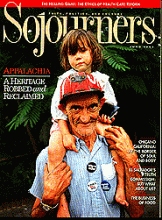The fundamental element of this pastoral approach [of accompaniment] has been to be with the people, to eat with them, to sleep under the same stars and storms, to be persecuted like them, to resist like them. That is why, when they burned the communities, I escaped with the people....
The next day, because it was Sunday, we had a Mass with the community that was fleeing through the jungle. We spread the altar cloth upon a tarp on the ground. In speaking of the gospels, we remembered the beatitudes: Blessed are the persecuted for of them is, already is, the kingdom of heaven. If these words are subversive, then blessed be the subversive gospel.
- Ricardo Falla, S.J., from an open letter to the Guatemalan people, published in the Guatemalan newspaper La Hora.
Sojourners: You have spoken about your pastoral work in the context of resistance. What does this mean given the current situation in Guatemala?
Ricardo Falla: Here, the reality is that Ixcan is a war zone, an area where there is war between the army and the URNG [rebel guerrillas], and more concretely with the EGP, which is the name of the guerrillas of that particular area.
But another part of the reality is that there are civilians, communities. So what are these people striving for? They are struggling for survival, struggling for their land, struggling for their own organization, and so on. All this you can call resistance.
Read the Full Article

